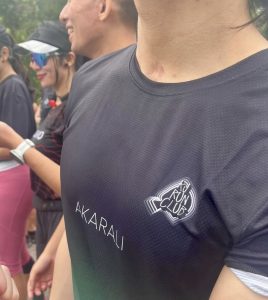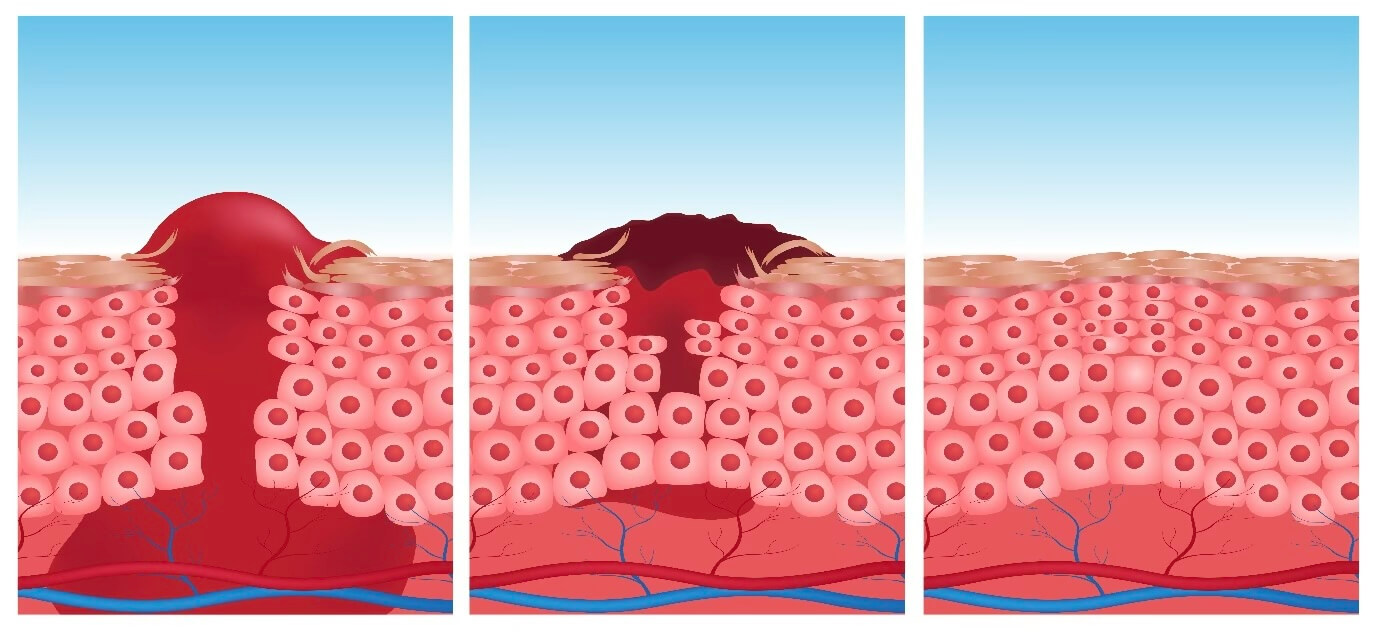

In the latest development, Tongkat Ali (Eurycoma Longifolia) shows promising results in accelerating wound healing, reducing scarring and skin infections. This latest discovery by scientists widens its appeal for anti-aging skincare applications.
This article will go in-depth into the uses of Tongkat Ali in treating minor skin wounds, inflammation, and skin conditions such as acne and rashes. Ultimately our assessment and review will guide you to decide if Tongkat Ali is the best remedy for anti-aging or skin rejuvenation.
As we age, our skin loses its natural ability to repair itself from everyday “micro-damage” caused by UV exposure, pollution, oxidative stress (free radicals) and mechanical stress (facial expressions, friction). This slow accumulation of unrepaired damage leads to wrinkles, loss of elasticity, hyperpigmentation and thinning of the skin.
But now, research suggests that you may reduce premature skin aging if you take Tongkat Ali supplement regularly to complement your daily skincare regime (eg: moisturizing your skin regularly, using sunblock and minimizing direct UV exposure).
Experts believe that aging skin is biologically similar to skin that has not properly healed from chronic low-grade wounds, and natural herbs such as Tongkat Ali promote angiogenesis (new blood vessels to supply nutrients to your skin), collagen production and immune regulation (due to its strong anti-inflammatory) properties.
Bryan Johnson and David Pascoe are two longevity enthusiasts that took Tongkat Ali daily and still look younger than their age suggests.

While scientists have now found new applications of Tongkat Ali (Eurycoma Longifolia) in the treatment of minor cuts on skin due to its anti-inflammatory properties, this discovery reaffirms that skin recovery from micro damages using Tongkat Ali is potentially an anti-aging agent that can reduce premature skin aging in men.
Wound healing and anti-aging are two sides of the same coin. Tongkat Ali may help in preventing skin degradation or micro damages if you have hormonal or nutrient deficiency.
“Wound healing and anti-aging are two sides of the same coin” said Alice, a 38-year-old former nutritionist of GNC, adding that the biological pathways that repair a skin wound — fibroblast activation, collagen synthesis, controlled inflammation — are the same pathways skincare taps into to reverse wrinkles, sagging, and dullness.
That’s why anti-aging skincare is often about tricking your skin into thinking it needs to heal — but in a smart, gentle way. As a result, supplements and herbal extract such as Tongkat Ali is reported to have positive effects on skin recovery from micro wounds or damages.
Let’s look at how Tongkat Ali can be beneficial to your skin or as an anti-aging supplement.
Tongkat Ali is renowned for its anti-inflammatory and antioxidant effects, which are crucial in the wound healing process. Inflammation is the body’s initial response to injury, and managing it effectively can accelerate healing.
Antioxidants found in Tongkat Ali, on the other hand, help to neutralize free radicals, reduce oxidative stress and promote tissue repair.
In 2022, a study involving subjects with excisional wounds demonstrated the significant wound-healing capabilities of Tongkat Ali. The subjects were divided into four groups: untreated control, positive control (Hydrocyn aqua gel), vehicle hydrogel, and Tongkat Ali hydrogel.
The study found that the application of Tongkat Ali hydrogel significantly increased the percentage of wound contraction by 43.38% compared with the other groups during the inflammatory phase. Although the later stages of healing showed no significant difference compared to the medically certified Hydrocyn aqua gel, the early acceleration highlights the potential of Tongkat Ali in speeding up the initial healing phase.
Building on the findings of the 2022 study, further research in 2023 focused on the molecular mechanisms underlying Tongkat Ali’s wound-healing properties. This study again involved a similar number of subjects, divided into similar groups as the previous study. The focus was on Vascular Endothelial Growth Factor (VEGF) expression, a critical factor in wound healing. VEGF promotes angiogenesis, the formation of new blood vessels, which is essential for supplying nutrients and oxygen to the healing tissue.
The study found that VEGF expression in granulation tissue of subjects’ skin treated with Tongkat Ali hydrogel increased significantly compared to the untreated control group. This increase in VEGF expression underscores Tongkat Ali’s potential as a powerful agent in promoting wound healing through enhanced angiogenesis.
Collagen, a crucial component of the extracellular matrix, is essential for the strength and quality of wound healing. In another 2023 study on Tongkat Ali, researchers investigated the effects of Tongkat Ali-infused hydrogel on wound healing again in several subjects. The study included four groups: a negative control, a positive control with Hydrocyn aqua gel, a vehicle (Xanthan) hydrogel group, and a Tongkat Ali group.
Treatments were applied twice daily for 21 days and the results showed that Tongkat Ali significantly improved the quality of healed skin, with the thickest new epidermis and increased dermal thickness compared to other groups.
Histological analysis revealed that Tongkat Ali hydrogel promoted the formation of mixed-oriented collagen fibres and dense collagen bundles, suggesting that Tongkat Ali is an effective agent for enhancing wound healing, reducing scarring, and improving skin quality.
In addition to its wound-healing properties, Tongkat Ali has demonstrated significant antimicrobial activity. In a comprehensive review of ten in vitro studies, Tongkat Ali was tested against 18 different pathogenic microorganisms.
The results were overwhelmingly positive, with seven out of ten studies showing complete antimicrobial activity, and two showing partial activity.
One notable study by Alloha et al. investigated the effects of Tongkat Ali root extract against common oral pathogens, Candida albicans and Streptococcus mutans, revealing significant antibacterial and antifungal effects.
Another study by Danial et al. found that extracts of Tongkat Ali exhibited potent antibacterial activity against several bacterial strains, including Bacillus subtilis, E. coli, and Staphylococcus aureus.
These antimicrobial properties are particularly relevant for wound healing as well as skincare, as they suggest that Tongkat Ali can help prevent and treat infections in wounds and other skin conditions, promoting faster and more effective healing.
Apart from wound healing, Tongkat Ali has demonstrated efficacy in treating various skin conditions characterized by inflammation, such as acne, rashes, and inflamed spots.
The extract effectively inhibited carrageenan-induced hind paw oedema and reduced ear oedema in a dose-dependent manner. These findings suggest that Tongkat Ali could be beneficial in managing inflammatory skin conditions, providing a natural alternative to conventional treatments.
Tongkat Ali’s antioxidant properties also contribute to its potential in skincare. By reducing oxidative stress, it helps protect the skin from damage caused by free radicals, which are often responsible for premature aging and skin damage.
Similarly, Tongkat Ali’s gastroprotective effects indicate its ability to support overall health via the gut, which indirectly benefits skin health. The study found that Tongkat Ali extract effectively prevented gastric ulcer formation, which can affect the health of the gut microbiome. This highlights the broad spectrum of Tongkat Ali’s therapeutic properties.
Stress is a significant factor affecting skin health, often exacerbating conditions like acne, eczema, and even healing. Tongkat Ali has been shown to improve stress hormone profiles and mood states. In a study involving 63 subjects, supplementation with Tongkat Ali root extract significantly reduced tension, anger, and confusion while improving cortisol and testosterone levels. By balancing stress hormones, Tongkat Ali can indirectly promote healthier skin, as chronic stress is known to impair healing, skin barrier function and exacerbate inflammatory skin conditions.
According to many research studies, testosterone plays a critical role in overall skin health. Adequate levels of testosterone help maintain skin thickness, elasticity, and moisture, contributing to a youthful appearance. Testosterone also influences the production of sebum, the skin’s natural oil, which helps protect the skin from drying out and becoming prone to infections and irritations.
Low testosterone levels can lead to several skin issues, such as dryness, increased wrinkles, and a higher susceptibility to acne and other inflammatory skin conditions.
By boosting testosterone to healthy levels, Tongkat Ali may help maintain healthier and more elastic skin. A meta study of 9 different clinical studies concluded that Tongkat Ali might be highly useful in maintaining healthy testosterone levels in subjects who supplemented regularly with standardized hot-water Tongkat Ali root extract.
This hormonal boost not only aids in further stress reduction but also promotes skin health by enhancing the skin’s natural protective and regenerative functions.

Given its anti-inflammatory, antioxidant, antimicrobial, and wound-healing properties, Tongkat Ali holds great potential as a potent bioactive ingredient in skincare products. It could be formulated into gels, creams, and serums aimed at treating acne, reducing inflammation, and promoting faster healing of cuts and abrasions.
Its ability to enhance VEGF expression, accelerate wound contraction, and boost collagen production, makes it particularly useful for post-procedure skincare, aiding in the recovery process for inflammation and scarring after treatments such as laser therapy, micro needling, chemical peels, or acne extraction.
Generally there are two ways of using Tongkat Ali for better skin or as an anti-aging supplement for men and women above 40:
There are no reported side effects when applying Tongkat Ali on skin after applying it for more than 4 hours or overnight, but please avoid eye contact. Should there be any adverse allergic skin reaction from allergens or contaminants, please consult your nearest doctor or medical professionals.
Tongkat Ali has demonstrated significant potential in wound healing and skincare. Its anti-inflammatory, antioxidant, antimicrobial, and wound-healing properties make it a promising, potent natural ingredient for treating various skin conditions and promoting faster wound recovery. As more research emerges, the incorporation of Tongkat Ali into dermatological products could revolutionize natural skincare, offering effective and safe solutions for a range of skin concerns.
By leveraging the healing power of nature, Tongkat Ali could provide a truly holistic approach to skincare, supporting both the health of the skin and the overall well-being of individuals from within as a dietary supplement as well as without as an external and effective natural topical applicant. As we continue to explore the therapeutic potential of medicinal plants, Tongkat Ali stands out as a versatile and valuable addition to the world of natural medicine and skincare.
If you are interested in experiencing the benefits of Malaysian single-origin standardized hot-water Tongkat Ali root extract for yourself, you can get your hands on our dose-optimized signature capsules, pure powder extract, or potent coffee, available worldwide with international delivery via DHL express.

Alex Kua leads AKARALI’s Global Partnership Community to help athletes, sports communities, and thousand of others optimize their well-being through evidence-based research that enables them to make better informed decisions. His legal and business consulting background underpins the rigorous data-driven approach in his writing – from hours of interviews, real-world performance data, and firsthand experiences of real people – offering actionable insights that connects clinical research, emerging health trends, and real-world applications. He is also an experienced researcher in herbal nutrition, with years of deep technical knowledge on Tongkat Ali (Eurycoma longifolia), including quality standards, industry benchmarks, lab tests, clinical trials, and the use of natural herbs by collaborating with top scientists, herbal experts, and nutritionists. As part of the core team behind AKARALI’s knowledge portal, he empowers people worldwide to access the benefits of high-quality herbal nutrition in a way that is effective, sustainable, and safe. He is also an avid runner, with regular participation in local sports communities and running events.
Our articles are third party reviewed by our panel of experts and medical advisors to ensure the facts are accurate and credible. These are validated against multiple source references which include but not limited to research studies, peer-reviewed journals, pre-clinical studies, clinical tests and other credible publications.
Our panel of medical advisors and experts are highly experienced in their individual fields. However, they do not provide any medical advice or recommendations arising from content published in this article.
Disclaimer:
The content published on this website is for educational purposes and should not be viewed, read, or seen as a prescription or constitute any form of medical advice. We recommend you consult your nearest GP or doctors before consuming Tongkat Ali or any products which contain Tongkat Ali. For further information, kindly refer to our Frequently Asked Questions (FAQ) for more information.